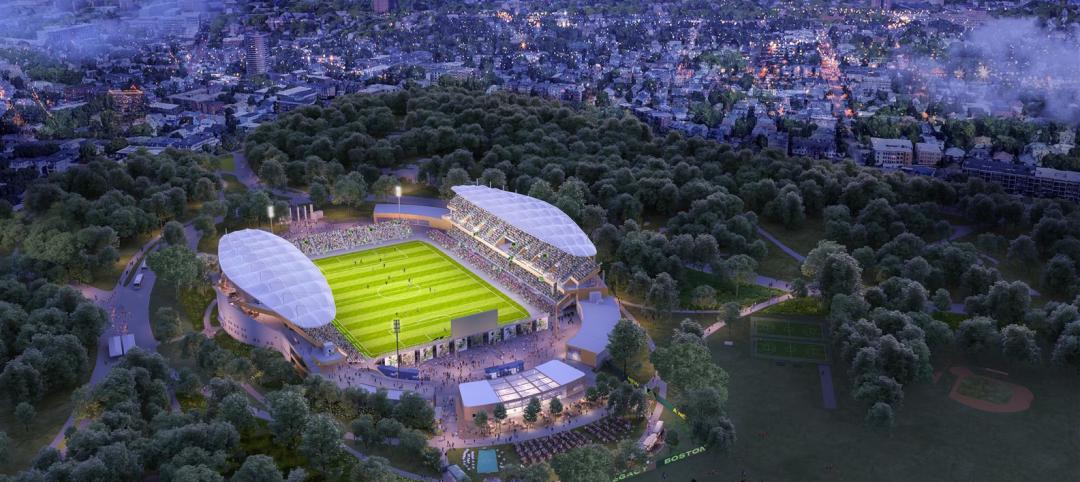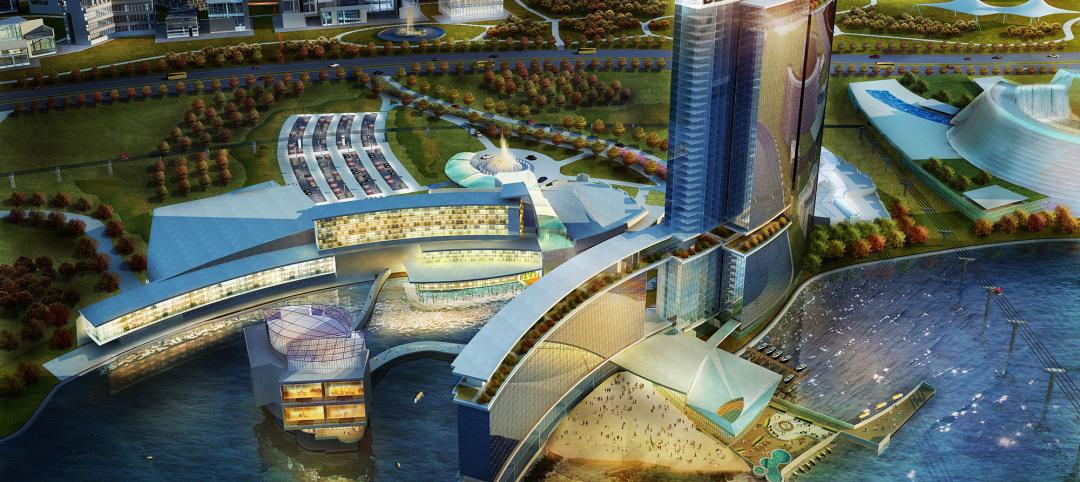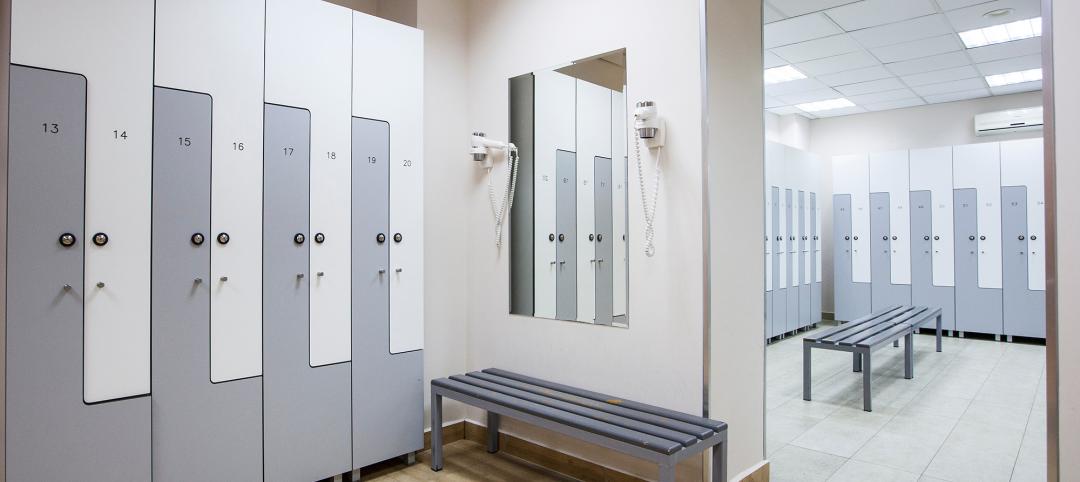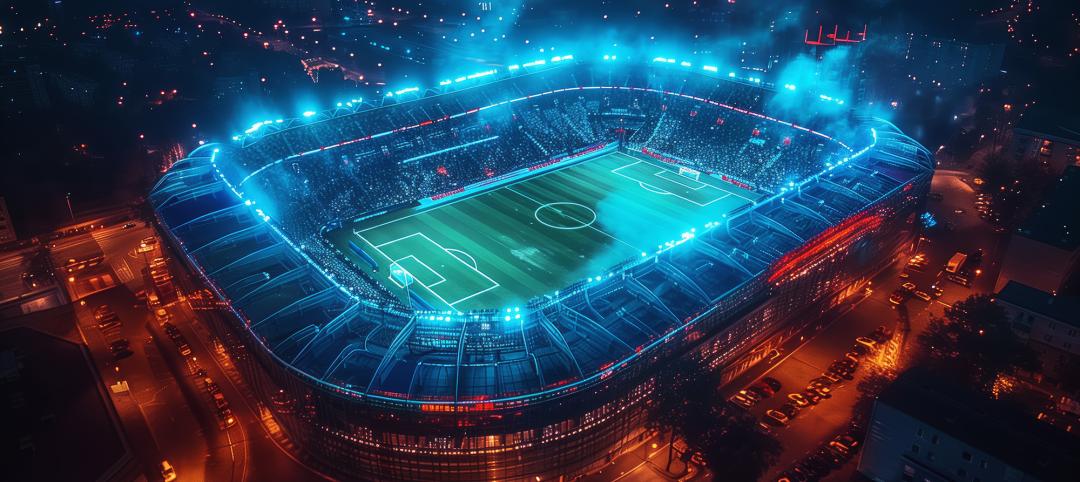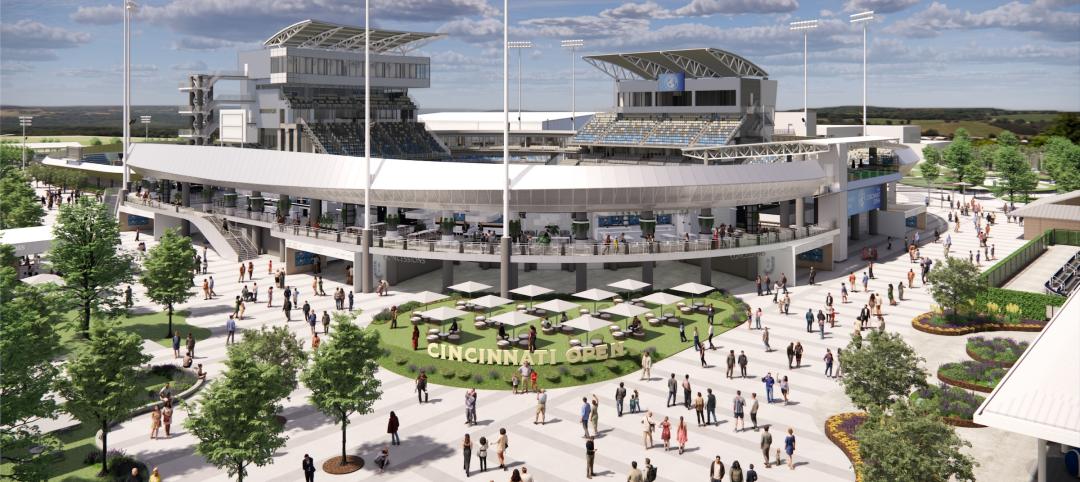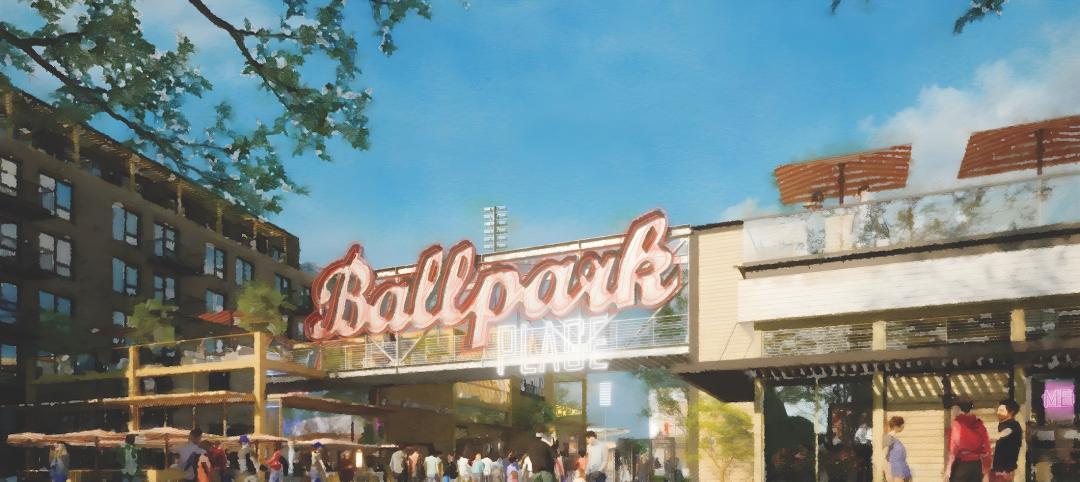This evening, Anschutz Entertainment Group (AEG) and MGM Resorts International officially open their 650,000-sf T-Mobile Arena in Las Vegas with a concert featuring The Killers, Wayne Newton, and Shamir.
The $375 million arena is seen as part of that city’s larger strategy to finally lure a professional sports team. At the least, the arena is the latest large-scale entertainment venue for a city where gambling is no longer the main event in town.
T-Mobile Arena is located on 16 acres along Las Vegas Boulevard. Its design, by the Kansas City-based firm Populous, takes visual cues from both the Las Vegas Strip and the desert that surrounds this city. A glass façade faces the street, and gold-and-terracotta toned stone is the main element of the building’s bunker suite wall.
Desert and mountain influences are evident in the south and west facades of the arena via a solid skin that protects against intense desert heat. This “of the desert” skin wraps the arena’s elliptical form with undulating bands of metal that evoke the color and layering of desert mountains.
A black-and-white video on Populous’ website claims this arena features several “firsts,” including two 96-ft-high club towers and the Hyde Lounge, as well as two event-level VIP drop-off areas and lounges.
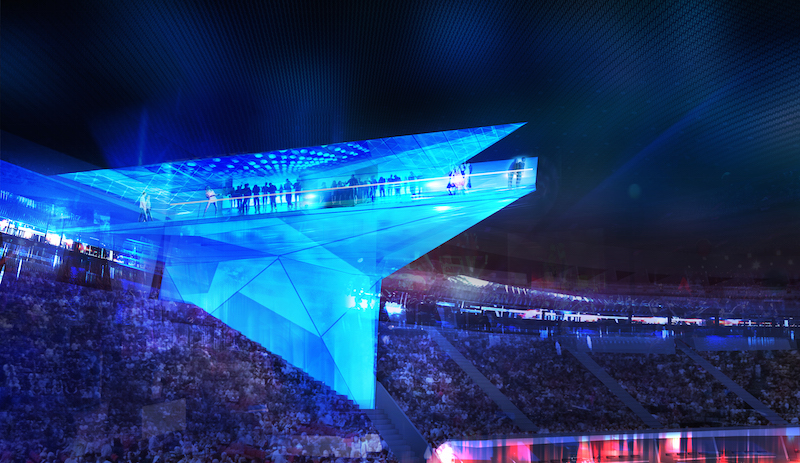 Two sponsored club towers, each 96 feet above the performance floor, are among the amenities offered at the 650,000-sf T-Mobile Arena. Image: Populous
Two sponsored club towers, each 96 feet above the performance floor, are among the amenities offered at the 650,000-sf T-Mobile Arena. Image: Populous
The building provides 44 luxury suites, eight bunker suites, 1,800 club seats, and 124 loge box seats. However, the owners insist they are targeting “multiple social demographics,” and will offer a “broad range of seating and event options.”
The arena will have a 17,750 seating capacity for end-stage events, 19,200 for center-stage events, and 18,500 for sporting events. The arena makes use of a new arrangement of the seating bowl, to allow for maximum seating capacity when set up for concerts.
A 9,000-sf LED video mesh, which Populous purports is largest of its kind, overlays the glass façade above the main entrance, and is visible from Las Vegas Boulevard. This building will also have what Populous claims is the first-ever exterior concert stage. Mark Faber, AEG’s senior vice president of global partnerships, told Vegasinc.com that the two-acre Toshiba Plaza outside the arena could accommodate up to 5,000 people.
He anticipates booking about at least 100 ticketed events per year.
“In our world, it’s all about the guest experience,” said Faber. “We want to have guests feel comfortable and safe. We think this will transcend the marketplace.” He noted specifically that the facility has 30 doors in one entrance, which would minimize how long people stand in line.
However, there is still concern locally about the amount of traffic T-Mobile is going to create, especially given that it’s near three other arenas. Most out of towners will probably walk or cab to an event from their hotels. But for locals driving in from the suburbs, traffic and parking could be hassles.
The Las Vegas Review-Journal reports that, in the weeks ahead, MGM will roll out a public education campaign focused on the urban arena experience. The strategy is to persuade locals to make a night of the sports or entertainment event: Arrive early. Eat out before the event. Walk to the arena. Stop for a drink after the event. Play a few slots and allow traffic to clear before going home.
MGM also announced in January a $90 million plan that would include construction of a new $54-million, 3,000-space parking garage near the northwest corner of its Excalibur Hotel property.
T-Mobile Arena opens just as Sheldon Adelson, who owns Las Vegas Sands, is pushing for public money to pay for a $1.3 billion, 65,000-seat stadium just off the Las Vegas Strip, in the hopes of attracting an NFL franchise. That stadium is still in concept phase.
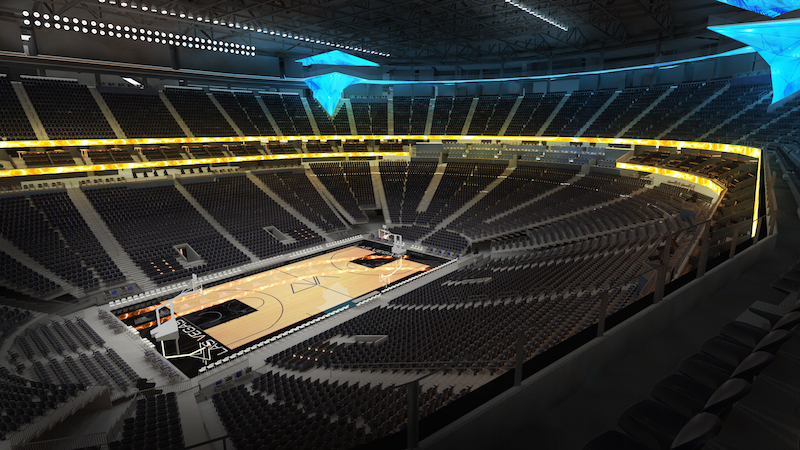 The arena will seat 18,500 for sporting events, and Las Vegas hopes this new facility will help the city attract a professional sports team. Image: Populous
The arena will seat 18,500 for sporting events, and Las Vegas hopes this new facility will help the city attract a professional sports team. Image: Populous
More likely are Las Vegas’ chances of securing a professional hockey team, for which T-Mobile would be its home ice. Bill Foley, chairman of Jacksonville, Fla.-based Fidelity National Financial, has stated he will ante up $500 million for an expansion NHL team.
The league is considering applications from Las Vegas and Quebec City. NHL Commissioner Gary Bettman said at GM meetings last month that owners would need to decide by June if the league is to expand for the 2017-18 season, according to Fox Sports. The Review-Journal has reported that Foley is finalizing plans for a practice facility on the outskirts of Las Vegas so it would be ready for the team’s first season in 2017.
Related Stories
Sports and Recreational Facilities | Oct 24, 2024
Stadium renovation plans unveiled for Boston’s National Women’s Soccer League
A city-owned 75-year-old stadium in Boston’s historic Franklin Park will be renovated for a new National Women’s Soccer League team. The park, designed by Fredrick Law Olmsted in the 1880s, is the home of White Stadium, which was built in 1949 and has since fallen into disrepair.
Sports and Recreational Facilities | Oct 17, 2024
In the NIL era, colleges and universities are stepping up their sports facilities game
NIL policies have raised expectations among student-athletes about the quality of sports training and performing facilities, in ways that present new opportunities for AEC firms.
Designers | Oct 1, 2024
Global entertainment design firm WATG acquires SOSH Architects
Entertainment design firm WATG has acquired SOSH Architects, an interior design and planning firm based in Atlantic City, N.J.
Products and Materials | Aug 31, 2024
Top building products for August 2024
BD+C Editors break down August's top 15 building products, from waterproof wall panel systems to portable indoor pickleball surface solutions.
Designers | Jul 29, 2024
Inclusive design for locker rooms: Providing equitable choice and access
SRG designers pose the question: What would it look like if everyone who wanted to use a restroom or locker room could?
Great Solutions | Jul 23, 2024
41 Great Solutions for architects, engineers, and contractors
AI ChatBots, ambient computing, floating MRIs, low-carbon cement, sunshine on demand, next-generation top-down construction. These and 35 other innovations make up our 2024 Great Solutions Report, which highlights fresh ideas and innovations from leading architecture, engineering, and construction firms.
Sports and Recreational Facilities | Jul 15, 2024
Smart stadiums: The future of sports and entertainment venues
These digitally-enhanced and connected spaces are designed to revolutionize the fan experience, enhance safety, and optimize operational efficiency, according to SSR's Will Maxwell, Smart Building Consultant.
Sports and Recreational Facilities | May 23, 2024
The Cincinnati Open will undergo a campus-wide renovation ahead of the expanded 2025 tournament
One of the longest-running tennis tournaments in the country, the Cincinnati Open will add a 2,000-seat stadium, new courts and player center, and more greenspace to create a park-like atmosphere.
Sports and Recreational Facilities | Apr 25, 2024
How pools can positively affect communities
Clark Nexsen senior architects Jennifer Heintz and Dorothea Schulz discuss how pools can create jobs, break down barriers, and create opportunities within communities.
Mixed-Use | Apr 9, 2024
A surging master-planned community in Utah gets its own entertainment district
Since its construction began two decades ago, Daybreak, the 4,100-acre master-planned community in South Jordan, Utah, has been a catalyst and model for regional growth. The latest addition is a 200-acre mixed-use entertainment district that will serve as a walkable and bikeable neighborhood within the community, anchored by a minor-league baseball park and a cinema/entertainment complex.


